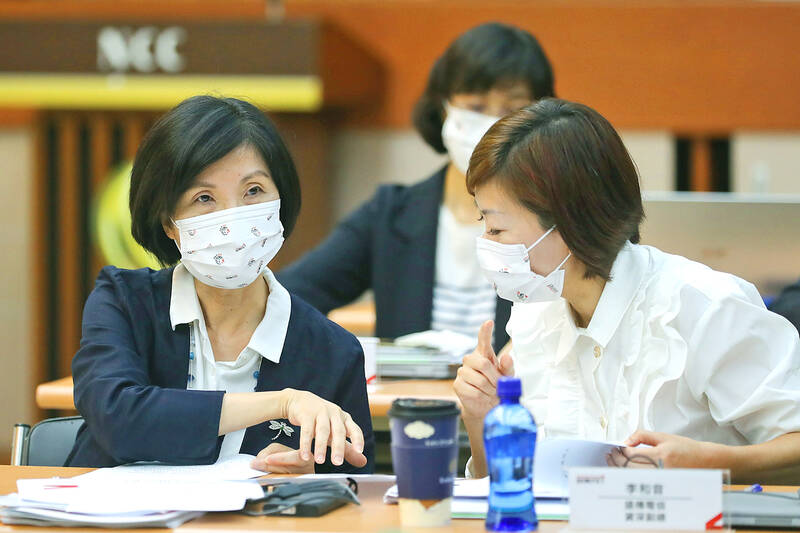With 5G services entering their third year, Far EasTone Telecommunications Co (遠傳電信) is aiming to boost its 5G subscriber penetration rate to 40 percent this year from more than 30 percent last year.
It would be reasonable to see an increase of 10 percentage points this year, Far EasTone president Chee Ching (井琪) said on Wednesday.
Benefiting from an expansion of its 5G subscriber base, the company’s net profit and revenue would grow this year more than last year, Ching said, adding that more 5G subscriptions would constitute one of the key drivers of the growth.

Photo: CNA
Far EasTone has posted a 20 percent increase in average revenue per user (ARPU) from 5G subscribers’ renewals in terms of monthly fees, it said.
The telecom saw its ARPU climb to NT$724 (US$24) from post-paid mobile users in the third quarter of last year, from NT$719 in the second quarter and NT$708 in the third quarter of 2021.
As telecom services have become an integral part of people’s life, Far EasTone’s business would be less affected by the downturn in the economy, compared with consumer electronics companies, Ching said.
“People may cut spending on nonessential items when paychecks shrink, but it is unlikely that they would cancel their telecom services,” she said.
Far EasTone expects capital spending to be lower than last year’s NT$11.1 billion as investment on 5G deployment has peaked, Ching said.
The company also expects revenue from its “new economy” businesses, or nontraditional telecom services, including cloud-based services, 5G private networks and e-commerce services, to rise to 20 percent of total revenue this year, from 19 percent in the first three quarters of last year.
Asked about Far EasTone’s planned acquisition of Asia Pacific Telecom Co (亞太電信), Ching said she expected the merger to take effect in the third quarter at the earliest.
The acquisition is still under review by the National Communications Commission and is subject to the approval of the Fair Trade Commission.
Far EasTone expects the deal to generate synergies within a year.

NEW IDENTITY: Known for its software, India has expanded into hardware, with its semiconductor industry growing from US$38bn in 2023 to US$45bn to US$50bn India on Saturday inaugurated its first semiconductor assembly and test facility, a milestone in the government’s push to reduce dependence on foreign chipmakers and stake a claim in a sector dominated by China. Indian Prime Minister Narendra Modi opened US firm Micron Technology Inc’s semiconductor assembly, test and packaging unit in his home state of Gujarat, hailing the “dawn of a new era” for India’s technology ambitions. “When young Indians look back in the future, they will see this decade as the turning point in our tech future,” Modi told the event, which was broadcast on his YouTube channel. The plant would convert

‘SEISMIC SHIFT’: The researcher forecast there would be about 1.1 billion mobile shipments this year, down from 1.26 billion the prior year and erasing years of gains The global smartphone market is expected to contract 12.9 percent this year due to the unprecedented memorychip shortage, marking “a crisis like no other,” researcher International Data Corp (IDC) said. The new forecast, a dramatic revision down from earlier estimates, gives the latest accounting of the ongoing memory crunch that is affecting every corner of the electronics industry. The demand for advanced memory to power artificial intelligence (AI) tasks has drained global supply until well into next year and jeopardizes the business model of many smartphone makers. IDC forecast about 1.1 billion mobile shipments this year, down from 1.26 billion the prior

People stand in a Pokemon store in Tokyo on Thursday. One of the world highest-grossing franchises is celebrated its 30th anniversary yesterday.

Zimbabwe’s ban on raw lithium exports is forcing Chinese miners to rethink their strategy, speeding up plans to process the metal locally instead of shipping it to China’s vast rechargeable battery industry. The country is Africa’s largest lithium producer and has one of the world’s largest reserves, according to the US Geological Survey (USGS). Zimbabwe already banned the export of lithium ore in 2022 and last year announced it would halt exports of lithium concentrates from January next year. However, on Wednesday it imposed the ban with immediate effect, leaving unclear what the lithium mining sector would do in the